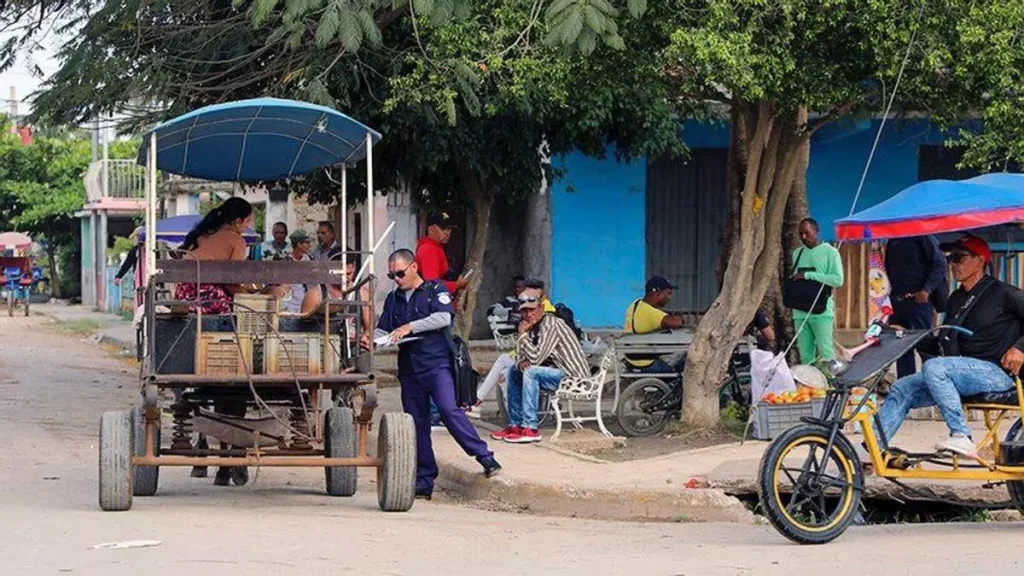This week alone, more than 7,500 fines were imposed nationwide.

![]() 14ymedio, Havana, September 28, 2025 — The recent deployment of inspectors in Sancti Spíritus province, described with pomposity by the official media Escambray, is nothing more than a new assault against the few commercial spaces where food and basic products can still be bought, although at high prices. More than 800 inspections, nearly 190 fines, business closures and seizure of goods are part of what the authorities celebrate as an achievement in the so-called “fight against corruption and economic crime.”
14ymedio, Havana, September 28, 2025 — The recent deployment of inspectors in Sancti Spíritus province, described with pomposity by the official media Escambray, is nothing more than a new assault against the few commercial spaces where food and basic products can still be bought, although at high prices. More than 800 inspections, nearly 190 fines, business closures and seizure of goods are part of what the authorities celebrate as an achievement in the so-called “fight against corruption and economic crime.”
In the province, irregularities such as illegal chalkboards, “abusive prices” and “improper” use of electronic payment gateways were penalized. The sanctions were mainly imposed on self-employed workers and private businesses, who handed over more than a million pesos in fines. The products with the most price violations were rice, cooking oil, detergent, powdered milk and sausages, all more or less staples in Cuban homes.
Those who didn’t have their goods confiscated were again warned to sell at capped prices, which, as sellers have complained in several cases, sometimes do not even cover the cost of acquisition.
What is in theory a matter of ensuring “legality” and “consumer protection,” has in practice become a witch hunt by the Government that occurs more and more frequently. The situation is also not unique to Sancti Spíritus. In Havana, the “Fourth National Exercise for Preventing and Combating Crime” has also resulted in surprise inspections, millions of pesos in fines and business closures.
In Metropolitan Park, reported the Havana authorities, the private business Salsa Rio was sanctioned for not properly facilitating payments by digital gateways
In Metropolitan Park, reported the Havana authorities, the private business Salsa Rio was sanctioned for not properly facilitating payments by digital gateways. In the municipality of Plaza de la Revolución, “90 control actions were carried out with fines amounting to more than 1.2 million pesos, and the temporary immobilization of 20 actors for hygiene violations along with the detection of 11 illegal vendors. Documents on three projects were inspected and non-performing activities halted,” the official press reported.
At the national level, according to a report on the site Cadena Agramonte, this week alone more than 7,500 fines were imposed nationwide, the result of more than 12,000 inspections. The sanctions amounted to almost 24 million pesos collected. A blow not only for those who try to survive with their business, but for a whole population that depends, in many cases, on the informal market to find products that the State is unable to put on the counters. However, the official press proudly declared that not a single province was freed of fines for “illegalities.”
The emblematic example has been that of La Cuevita, temporarily closed by the government of Havana with the excuse of carrying out repairs, but this week it is still crowded. “This is what the people live on; they can’t shut it down,” a seller told 14ymedio.
La Cuevita, temporarily closed by the government of Havana with the excuse of carrying out repairs and this week still crowded
At the beginning of the year, in April, something similar happened on Holguín’s 13th Street. After a “control operation” an informal market was closed; fines were imposed, and there were confiscations and detentions. The sellers pretended for a few days to respect the capped prices, but the candonga [deception] soon returned to its usual rhythm.
On more than one occasion the sellers themselves have denounced the arbitrariness of the Government, which not only imposes prices that do not match the demand and cost of acquiring the products, but also sends hordes of inspectors who, record book in hand, seek more to collect money in fines than to control illegalities.
Osmel Ramírez, a self-employed man from Mayarí, was summoned by the police this week after denouncing an inspector for her abusive behavior. According to Ramírez, the official frequently visits him, and when she finds the slightest infringement, she imposes the maximum fine possible. “People like her hurt more than the blackouts,” he wrote on social media.
The inspector, he said, had already fined him 45,000 pesos when he started his business, and now wanted to collect another 16,000 “for some cigarettes I had in my pocket. That’s the way they stimulate the private sector: encourage us to go bankrupt.”
Translated by Regina Anavy
____________
COLLABORATE WITH OUR WORK: The 14ymedio team is committed to practicing serious journalism that reflects Cuba’s reality in all its depth. Thank you for joining us on this long journey. We invite you to continue supporting us by becoming a member of 14ymedio now. Together we can continue transforming journalism in Cuba.
